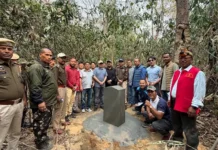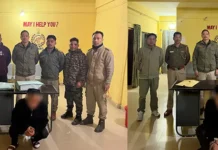NAHARLAGUN, Mar 15: Health Services Director, Dr Moromor Lego, urged the state’s National Vector Borne Disease Control Programme (NVBDCP) staff to “work harder than ever in the final leg of the fight for malaria elimination.”
Addressing the inaugural function of a three-day meeting of the NVBDCP on malaria and other vector-borne diseases, conducted here by the health department from 11-13 March, Dr Lego said that “at such times it is very important to maintain sound health of both mind and body.”
NVBDCP SPO, Dr KT Mulung, highlighted the objectives of the NVBDCP and emphasized on “the goal of malaria elimination from the districts by 2022, from the state by 2025, and from the nation by 2030.”
The SPO also spoke about the state and district malaria elimination task forces and rapid response teams.
“The task forces are to guide the state and the districts in malaria elimination,” Dr Mulung said, and informed that “the state cabinet has approved an act whereby malaria will become a notifiable disease.”
Dr Mrigen Deka, representing the union NVBDCP directorate, spoke on “the norms of activities of the state NVBDCP, since the state has now positively moved from Category 3 to Category 1 in such a short span of time.”
He informed that under the prevailing norms, the state should now target malaria elimination by 2025.
IDSP State Surveillance Officer, Dr L Jampa, spoke on the role of health staffers with respect to the ongoing Covid-19 pandemic.
“It emerged during the meeting that all the districts reported an annual parasite incidence of less than 1 (API>1), which means that if any thousand people in the state are randomly selected, the possibility of finding a case of malaria is nil,” the state NVBDCP informed in a release, adding, however, that “the declining (ABER) is a concern.”


